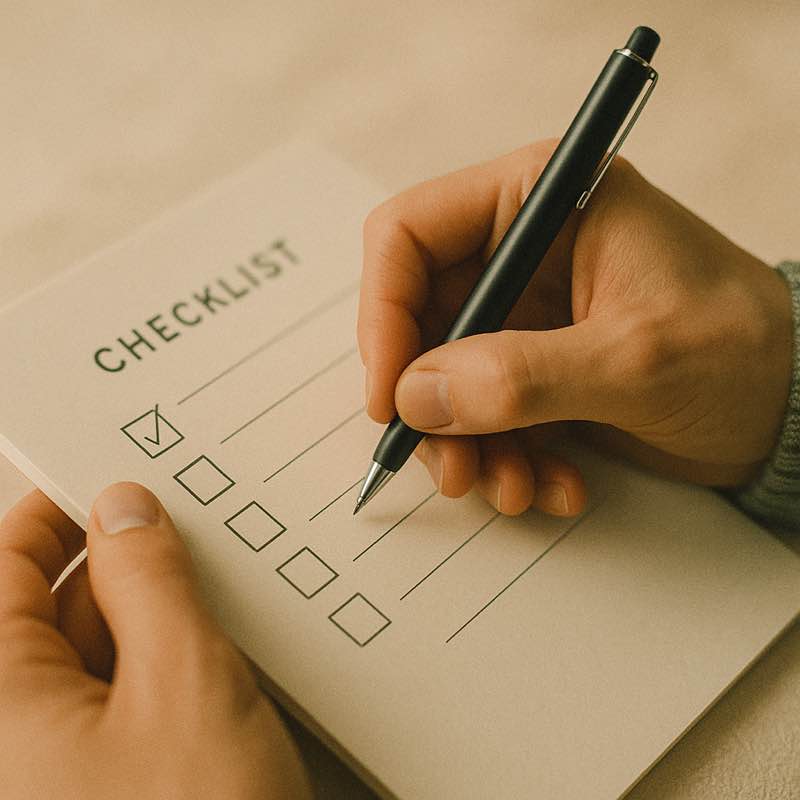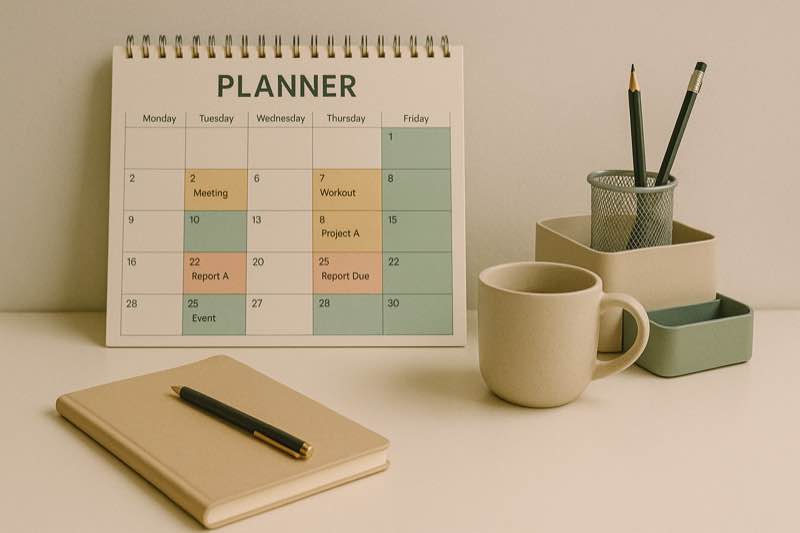Coping With ADHD Without Medication: Strategies That Work
While medication helps many people with ADHD, it's not the only path to better functioning. Non,medication approaches like mindfulness training, cognitive behavioral therapy, structured routines, and peer support can significantly improve attention, emotional regulation, and daily functioning. These strategies work by building external structure and training self,regulation skills.
ADHD coping without medication typically includes mindfulness, CBT or ADHD coaching, consistent routines, sensory tools, and peer support. These approaches reduce overwhelm and improve daily functioning by working with, rather than against, ADHD brain patterns.
You can start with a comprehensive self-assessment to organize your thoughts before meeting a professional.

Why Non,Medication Approaches Matter
Medication helps many people with ADHD, but it's not suitable or preferred by everyone. Non,medication strategies offer several advantages: they build lasting skills, have no side effects, can be used alongside medication, and address the behavioral and emotional aspects of ADHD that medication alone may not fully address.
Who Benefits from Non,Medication Approaches
| Option | Description |
|---|---|
| Medication Non,Responders | People who don't respond well to stimulant or non,stimulant medications, or experience unacceptable side effects |
| Preference for Natural Approaches | Individuals who prefer behavioral and lifestyle interventions over pharmaceutical treatments |
| Pregnancy and Nursing | Women who need ADHD management during pregnancy or breastfeeding when medication use is limited |
| Combination Therapy | People using medication who want additional tools for comprehensive symptom management |
| Mild to Moderate Symptoms | Adults with less severe symptoms who may achieve good functioning with behavioral strategies alone |
| Comorbid Conditions | Those with anxiety, depression, or other conditions where medication interactions are a concern |
Evidence,Based Non,Medication Strategies
Research supports several non-medication approaches for managing ADHD symptoms effectively.
Mindfulness and Meditation for ADHD
Mindfulness training helps develop the attention regulation and emotional control that are often impaired in ADHD. Regular practice can create measurable improvements in brain function.
Building a Mindfulness Practice for ADHD
Start Very Small
Begin with just 3,5 minutes daily. ADHD brains need to build meditation stamina gradually to avoid frustration and abandonment.
Use Guided Meditations
Apps like Headspace, Calm, or ADHD,specific programs provide structure and prevent mind,wandering during practice.
Focus on Movement,Based Practices
Try walking meditation, yoga, or tai chi if sitting still feels impossible. Movement can enhance focus for hyperactive types.
Practice Self,Compassion
When your mind wanders (and it will), gently return attention without self,criticism. This builds the skill of redirecting attention.
Create Environmental Supports
Set phone reminders, use the same location daily, and remove distractions to support consistent practice.
Types of Mindfulness Practice
| Option | Description |
|---|---|
| Breath Awareness | Simple breathing exercises that anchor attention in the present moment and can be done anywhere |
| Body Scan Meditation | Progressive attention to different body parts, helping develop sustained focus and body awareness |
| Mindful Movement | Yoga, walking meditation, or mindful exercise that combines physical activity with attention training |
| Loving,Kindness Meditation | Practices that develop emotional regulation and reduce the self,criticism common in ADHD |
| Mindful Daily Activities | Bringing full attention to routine tasks like eating, brushing teeth, or commuting |
| Noting Practice | Observing and labeling thoughts and emotions without judgment, building metacognitive awareness |
Cognitive Behavioral Therapy (CBT) for ADHD
CBT helps adults with ADHD develop practical skills for managing symptoms and challenging unhelpful thought patterns that develop from years of ADHD,related struggles.
Core CBT Skills for ADHD
Key CBT Techniques for ADHD Management
Thought Challenging
Learning to identify and question negative automatic thoughts like 'I'm lazy' or 'I always mess up' that often accompany ADHD.
Behavioral Activation
Scheduling positive activities and breaking overwhelming tasks into manageable steps to combat avoidance and procrastination.
Time Management Skills
Learning realistic time estimation, using timers, and building in buffer time for ADHD time blindness.
Organization Systems
Developing personalized systems for managing belongings, paperwork, and digital information that work with ADHD tendencies.
Problem,Solving Training
Step,by,step approaches to identifying problems, generating solutions, and implementing changes systematically.
ADHD Coaching: Professional Support for Life Skills
ADHD coaches specialize in helping adults develop practical strategies for managing executive function challenges in daily life.
What to Expect from ADHD Coaching
| Option | Description |
|---|---|
| Executive Function Skills | Time management, organization, planning, and task prioritization tailored to individual ADHD challenges |
| Accountability Systems | Regular check,ins, goal tracking, and support for following through on commitments and plans |
| Habit Formation | Building sustainable routines and systems that support daily functioning without overwhelming the ADHD brain |
| Strength Identification | Recognizing and leveraging ADHD,related strengths like creativity, energy, and outside,the,box thinking |
| Accommodation Strategies | Developing workplace and academic accommodations and learning to advocate for needed supports |
| Relationship Skills | Improving communication and managing ADHD's impact on personal and professional relationships |

Creating ADHD,Friendly Daily Routines
Structured routines reduce the cognitive load of constant decision,making and create predictable patterns that support executive function.
Building Sustainable Routines
Developing Routines That Stick
Start with One Routine
Choose either morning or evening routine to focus on first. Trying to change everything at once leads to overwhelm and failure.
Keep It Simple
Begin with 3,5 basic steps. Complex routines are harder to remember and maintain consistently.
Use Visual Reminders
Create checklists, use phone alarms, or place visual cues to prompt each step until the routine becomes automatic.
Build in Flexibility
Allow for ADHD variability by creating 'minimum viable routines' for low,energy days and fuller versions for good days.
Track and Adjust
Monitor what works and what doesn't. Routines should serve you, not stress you out.
Sample ADHD Daily Routine Framework
Sensory and Environmental Strategies
Many adults with ADHD are sensitive to their environment. Optimizing your surroundings can significantly improve focus and emotional regulation.
| Option | Description |
|---|---|
| Noise Management | Use noise,canceling headphones, white noise machines, or instrumental music to create optimal auditory environments |
| Visual Organization | Reduce clutter, use clear storage containers, color,code systems, and create designated spaces for important items |
| Lighting Optimization | Use bright light for focus tasks, dim light for relaxation, and consider light therapy for mood regulation |
| Movement Integration | Standing desks, stability balls, fidget tools, and regular movement breaks to channel hyperactivity productively |
| Scent and Air Quality | Essential oils for focus (peppermint, rosemary), good ventilation, and plants to improve air quality and mood |
| Technology Boundaries | App blockers during focus time, notification management, and designated phone,free zones for better attention |
Exercise and Physical Activity
Regular exercise is one of the most effective non-medication treatments for ADHD, with immediate and long-term benefits for attention and mood.
Building an ADHD,Friendly Exercise Routine
Choose Enjoyable Activities
Pick exercises you actually like. Consistency matters more than intensity for ADHD benefits.
Start Small and Build
Begin with 10,15 minutes daily rather than ambitious workout plans that lead to burnout and abandonment.
Include Variety
ADHD brains crave novelty. Rotate between different activities to maintain interest and engagement.
Time It Strategically
Exercise before challenging tasks to boost focus, or in the evening to burn off hyperactive energy.
Make It Social
Group classes, workout partners, or team sports add accountability and social connection.
Best Exercise Types for ADHD
| Option | Description |
|---|---|
| Cardio Activities | Running, cycling, swimming, or dancing that get heart rate up and provide immediate attention benefits |
| Martial Arts | Karate, taekwondo, or boxing that combine physical activity with focus training and discipline |
| Team Sports | Basketball, soccer, or volleyball that provide social interaction and varied, engaging movement |
| Yoga and Tai Chi | Mind,body practices that combine movement with mindfulness and stress reduction |
| Strength Training | Weight lifting or bodyweight exercises that build confidence and provide structure |
| Outdoor Activities | Hiking, rock climbing, or cycling that combine exercise with nature exposure and adventure |

Peer Support and Community
Connection with others who understand ADHD can provide validation, practical strategies, and ongoing motivation that professional support alone may not offer.
Benefits of ADHD Support Groups
How Peer Support Helps ADHD Management
Reduces Isolation
Meeting others with similar experiences reduces the shame and isolation that often accompany ADHD struggles.
Provides Practical Strategies
Learn real,world coping strategies from people who've successfully managed similar challenges.
Offers Accountability
Regular group meetings and shared goals create external accountability for behavior changes.
Normalizes Experiences
Hearing others share similar stories helps normalize ADHD experiences and reduces self,criticism.
Builds Social Skills
Practice communication and relationship skills in a supportive, understanding environment.
Finding ADHD Support
| Option | Description |
|---|---|
| Local Support Groups | CHADD chapters, hospital,based groups, or community mental health center offerings in your area |
| Online Communities | Reddit ADHD forums, Facebook groups, Discord servers, and specialized ADHD community platforms |
| Professional Groups | ADHD networking groups for entrepreneurs, professionals, or students with similar career challenges |
| Virtual Coworking | Body doubling sessions, virtual study groups, and accountability partnerships conducted online |
| Skill,Building Groups | CBT groups, mindfulness classes, or productivity workshops specifically designed for adults with ADHD |
| Family Support | Groups for partners and family members to learn about ADHD and develop supportive relationships |
Nutrition and Lifestyle Factors
While not a primary treatment, certain nutritional and lifestyle approaches may help some people manage ADHD symptoms more effectively.
Creating Your Personal ADHD Management Plan
Successful non-medication ADHD management requires a personalized approach that combines multiple strategies.
Developing Your Non,Medication ADHD Plan
Assess Current Challenges
Identify your biggest ADHD,related difficulties: time management, organization, emotional regulation, or relationships.
Choose 2,3 Core Strategies
Start with evidence,based approaches that appeal to you most: mindfulness, exercise, routines, or professional support.
Start Small and Build
Implement one small change at a time. Success with small changes builds momentum for bigger improvements.
Track Your Progress
Monitor mood, productivity, and symptom severity to identify what strategies work best for you.
Adjust and Evolve
Expect to modify your approach over time. What works may change with life circumstances and personal growth.
Build Support Systems
Include professional help, peer support, and family understanding in your overall management strategy.
You can start with a comprehensive self-assessment to organize your thoughts before meeting a professional.
When to Consider Professional Support
While self,management strategies are valuable, professional support can accelerate progress and provide specialized expertise.
Signs You May Benefit from Professional Help
| Option | Description |
|---|---|
| Persistent Functional Impairment | ADHD symptoms continue to significantly interfere with work, relationships, or daily functioning despite self,help efforts |
| Co,occurring Mental Health Issues | Depression, anxiety, trauma, or other conditions that complicate ADHD management and require specialized treatment |
| Safety Concerns | Driving issues, financial problems, or other safety risks related to impulsivity or inattention |
| Relationship Difficulties | ADHD symptoms are causing ongoing problems in marriage, parenting, or other important relationships |
| Workplace Challenges | Job performance issues, conflicts with supervisors, or need for formal workplace accommodations |
| Medication Considerations | Interest in exploring medication options or optimizing current medication regimens alongside behavioral strategies |
Key Takeaways
Non,medication approaches to ADHD management can be highly effective, especially when combined into a comprehensive, personalized plan. The key is consistency, self,compassion, and working with your ADHD brain rather than against it.
Remember: , Small, consistent changes are more effective than dramatic overhauls , External structure and accountability are crucial for ADHD success , Multiple strategies work better than relying on a single approach , Professional support can accelerate progress and provide expertise
If you're wondering whether your attention, organization, or impulse control challenges might be related to ADHD, take our free screening assessment to better understand your experiences and explore next steps.
This article provides educational information only and does not replace professional medical advice. For personalized ADHD management strategies, consult with licensed healthcare providers or certified ADHD professionals.
